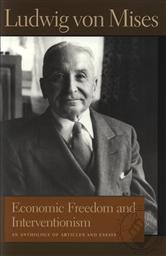Economic Freedom and Interventionism: An Anthology of Articles and Essays (Book/ Paperback)
by Ludwig von MisesProduct Overview
When Mises was 81 years old, he was invited to address a student rally at Madison Square Garden that was sponsored by the Young Americans for Freedom. He readily accepted. He prepared an address that those in attendance would never forget.
He looked out over the sea of young people who had rejected the socialistic propaganda then common on college campuses, and with a smile on his face and determination in his voice, he said:
"The spell of the dreadful conformity that threatened to convert our country into a spiritual desert is broken. There are again young men and women eager to think over the fundamental problems of life and action. This is a genuine moral and intellectual resurrection, a movement that will prevents us from falling prey to the arbitrary tyranny of dictators. As an old man I am greeting the young generation of liberators."
The audience roared in applause. Here was the world's greatest economist, a legend in his time, telling them that the future of freedom was in their hands. Clearly the rally brought joy to his heart.
Where can you find this remarkable speech? In this thrilling collection of essays newly published as Economic Freedom and Interventionism. This volume publishes 47 of the most difficult to find speeches, small essays, and reviews by Mises, all written for a popular audience during his American years. Here we see Mises bringing the results of a lifetime of teaching and research to engage the ideas of his time, during the height of the great battle of the 20th century between freedom and collectivism.
The rally at Madison Square Garden gave him the boost he needed. For in the previous year, the American Economic Association and the Committee for Economic Development released a task force report designed to teach high schoolers about economics. The report sought to explain that the choice between capitalism and communism was mostly a toss up. But take note that communism offers the special merit of "avoiding the instability of profit-motivated investment which characterizes private enterprise economies."
Who would give the AEA the rebuke it deserved? Mises again stepped forward and wrote a crushing attack. His essay called this report a "dangerous recommendation" and said that "a sensible boy or girl will certainly not put up with the confused and contradictory observations that a teacher, imbued with the philosophy of the report, may bring forward."
This important essay is also included here. Also there is his 1959 declaration that the Soviet system has been a complete economic failure, from the start--an essay he wrote even as famed economist Paul Samuelson kept predicting its success.
Mises was astoundingly prescient: "The Soviet system would collapse if its victims were to get reliable information about the normal life of the common man in Western Europe and this country."
Also you will find essays on why he wrote Human Action, the outlook for investment, how capitalism turns luxuries into necessities, how it is that the market turn the saver into a voter of sorts, and how citizens are harmed by inflation.
The section compiling Mises's essays on other economists is tremendously revealing. He writes on Murray Rothbard, Adam Smith, W.H. Hutt, Israel Kirzner, Sennholz, Greaves, and Keynes ("he was highly renowned, famous, and popular in a age of decay and disintegration, but his writings were the cause of these disasters: they were only symptoms") . He also discusses a late work by Hayek, and not favorably ("the third part of Professor Hayek's book is rather disappointing").
There are also academic papers here, such as those delivered at the Mont Pelerin Society and at the Conference on Science, Philosophy, and Religion. There are interviews and answers to questionnaires.
What a busy man was Mises! And thanks to this book, we have access to material that would have otherwise been lost. You could scour the Library of Congress for months and not find the materia
About the Author(s)
Ludwig von Mises
Ludwig Heinrich Edler von Mises (1881-1973) was an Austrian economist, philosopher, and classical liberal who was a prominent figure in the Austrian School of economic thought. Fearing a Nazi take-over of Europe, Mises emigrated to New York in 1940. He published his magnum opus Human Action in 1949. Mises had a significant influence on the Libertarian movement that developed in the United States in the mid-20th century.
List Price: $14.50
Our Price: $10.00
You Save:
$4.50(31%)
+ Free Shipping w/ $45 min. purchase
Category: Business & Economics
Format: Book (Paperback)
Publisher: Liberty Fund Inc
Date Published: Dec 01, 2006
Language: English
ISBN: 9780865976733
SKU: LT-78
Dimensions: 6.00 x 9.00 x 0.75 (in)
Weight: 18.60 oz










